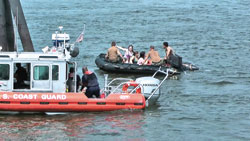The mate who was operating a Delaware River tugboat when its sludge barge struck a disabled duck tour boat last year was talking on his personal cell phone at the moment of the collision, the National Transportation Safety Board (NTSB) said.
Two Hungarian students were killed when Caribbean Sea's barge The Resource struck the drifting tour boat DUKW 34 on July 7, 2010, near Penn's Landing at Philadelphia.
 |
|
On the inflatable craft, a Navy special boat team helps rescue nine people from the Delaware River after a duck tour vessel was struck by the sludge barge The Resource. A Coast Guard response boat assists in the recovery. (Photo courtesy U.S. Navy/Petty Officer 1st Class Timothy Miller) |
Neither the NTSB nor the Coast Guard has determined the cause of the accident yet. In March, the NTSB publicly released documents including interview transcripts, witness statements, vessel specifications, company memos and other evidence.
Cell-phone records from that day indicate that Caribbean Sea's mate made or accepted 18 calls on his personal cell phone during the voyage, which began at 1315 and ended when the barge ran over the duck boat at 1437.
The 34-year-old mate made 13 calls, including at least two to his spouse and seven to his mother. He accepted three calls from his spouse and two from his mother. The phone records show he phoned his mother at 1432, and that call lasted until one minute after the crash.
Caribbean Sea operator K-Sea Transportation Partners LP told investigators that the mate later reported that he was confronted with a sudden family health crisis.
"The mate informed the senior manager that, while on watch, he had been made aware of a situation in which his young son had experienced a life-threatening emergency during a medical procedure taking place that day and that he had become consumed with dealing with this family crisis," the NTSB wrote in an incident synopsis.
The mate didn't tell anybody else on the towboat about his personal situation, K-Sea reported.
The authorities are still investigating why the mate didn't see the disabled tour boat or respond to radio calls warning him that his tow was about to strike the 33-foot vessel. The 250-foot barge was made fast to Caribbean Sea's starboard side. According to the captain, he had verbally instructed the mate to use the tugboat's upper wheelhouse, because the freeboard of the empty barge would otherwise obstruct his view.
"No problem," the mate told the captain, according to NTSB documents. "You don't have to worry. That's normal. That's where I would be."
The deck hand on watch told the NTSB that he saw the mate using the tugboat's upper wheelhouse at the beginning of the voyage. Just before the crash, the deck hand and engineer were both in the galley. They were not able to definitively confirm to investigators that the mate was still in the upper wheelhouse. Nobody else was out on deck.
"The mate did not delegate any responsibility for maintaining a lookout to either deck hand No. 2 or the engineer," the NTSB said.
The mate made a daily log entry indicating, before even the accident, that his vessels were already securely moored at the destination dock, the NTSB said. The entry also said, "1430 Made Rounds — Engine Room & Security." The logbook is kept inside the lower wheelhouse.
The mate has invoked Fifth Amendment rights regarding self-incrimination and has refused to talk to investigators. His lawyer, Frank DeSimone, declined to comment.
The Resource is owned by the city of Philadelphia, which uses it to transport sewage sludge between treatment facilities. K-Sea, owner of the 2,400-hp Caribbean Sea, is based in East Brunswick, N.J. DUKW 34 is operated by Ride The Ducks International LLC and had 35 passengers aboard.
In November 2010, the Coast Guard issued a safety alert urging commercial operators to develop policies limiting cell-phone conversations and texting by crews while navigating a vessel.
K-Sea already had an internal policy. The company sent a memorandum to its entire fleet in 2006 explaining the dangers of becoming distracted by personal devices. The memo cites a grounding in the Baltic Sea that occurred after the watch officer abandoned the wheelhouse of his containership and headed to the bridge wing because the phone reception was better.
"K-Sea policy prohibits carrying a personal cell phone while on watch," the memo said. "The use of personal cell phones while off watch must be restricted to enclosed areas. … While it has become second nature to carry a cell phone everywhere we go, we must adjust to appropriate safety requirements."
